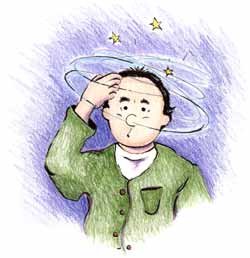Vertigo refers to dizziness. A sudden occurrence of vertigo means that there is something going wrong with the blood pressure or the brain, the latter being a more severe condition as any brain-related condition is often life-threatening. If you are suffering from vertigo, it is ideal that you seek medical attention immediately. Individuals trained in first aid should provide assistance through the secondary survey if the patient is conscious.
Causes
There are two main causes of vertigo: fluid fluctuations inside the ear and dehydration.
Vertigo is commonly caused due to labrynthitis which is an infection inside the ear and another condition called Meniere’s disease. In both cases, symptoms arise due to fluid fluctuations. This condition is caused due to the 
The other frequently occurring condition that results in vertigo is dehydration. Note that any condition that results in vertigo is accompanied by nausea and vomiting, therefore it is very easy to confuse inner ear fluctuations with dehydration. Dehydration often leads to other symptoms as well such as diarrhea.
If severe complications result due to either condition, seek medical help immediately. If inner ear related problems are not treated promptly, complete loss of hearing can result, whereas, if dehydration is left untreated, shock may result. Hence, immediate medical attention is crucial to prevent major symptoms from taking place.
The best way to remember the causes of vertigo is by remembering the mnemonic, AEIOU TIPS.
- Alcohol
- Epilepsy or exposure
- Insulin
- Oxygen deficiency or overdose
- Uremia
- Trauma
- Infection
- Poisonings or psychosis
- Stroke
Treatment
Treatment often relies on finding the root cause of vertigo. Once you have recognized the underlying cause, you will be able to treat vertigo by treating the condition that has caused it to occur. Prescription medicines for vertigo often include Meclizine. If vertigo is accompanied with nausea or vomiting, doctors may advise taking anti-emetic medication. If vertigo occurs by a sudden onset or if symptoms of vertigo or the underlying cause gets worse—for example, if accompanied with major symptoms such as seizures or stroke—call emergency medical help immediately.
Related Video to Vertigo
http://www.youtube.com/watch?v=utVcWuhPj3s
